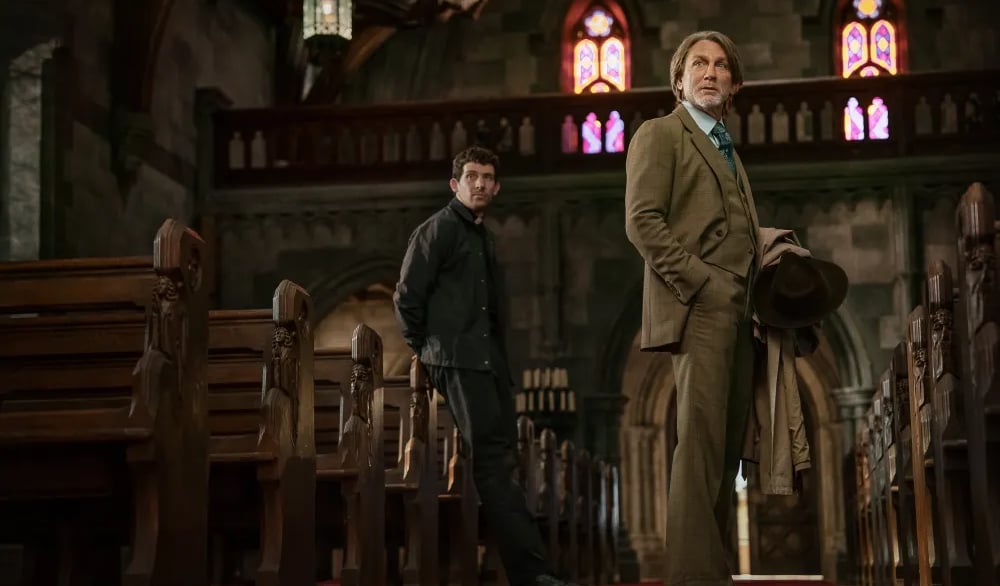Wake Up Dead Man: A Knives Out Mystery’ Review: Set in a Church Parish, and Pairing Daniel Craig and Josh O’Connor, the Third Entry in the Series May Be the Sharpest Yet
According To The variety “Wake Up Dead Man: A Knives Out Mystery” is an enticingly clever and droll, nearly pitch-perfect piece of murder-mystery fun — a whodunit that lives up to the expectations set six years ago by “Knives Out,” which offered its own perfect revival of the Agatha Christie spirit, with a tasty frosting of meta cheekiness. (It invited you to watch yourself watching yourself try to solve a deviously orchestrated crime.) Three years ago, “Glass Onion: A Knives Out Mystery” was just as clever, but like a lot of sequels to iconic hits it brandished a go-big-or-go-home quality that made it, in the end, a bit too top-heavy. It was still good, but not as good. “Wake Up Dead Man” gives us the best of both worlds. It, too, is trying for something grander than the first “Knives Out.” But this one is more rooted and organic than “Glass Onion,” and it returns us to the trap-door-of-reality ingenuity of the first film. These are movies that use their elemental trickiness to put us in touch with our wide-eyed inner child. They’re immersive, in that what’s-gonna-happen-next? way, though part of the reason that “Wake Up Dead Man” is more enthralling than “Glass Onion” is that the film works so fully on a human scale. It’s set in a small-town community in upstate New York, where the long-gray-haired and bearded Monsignor Jefferson Wicks (Josh Brolin) is the contempo version of a fire-and-brimstone cult leader, preaching fury in the form of piety. The first part of the movie is devoted to taking us inside his local empire of warped belief, which skews right-wing. But as soon as he ends up dead (trust me, this is just the film’s set-up, not a fatal spoiler), his half dozen or so core parishioners become the suspects. And the film turns into a deftly layered and at moments nearly philosophical head-spinner. “Wake Up Dead Man” is at once a winking allegory of our political era, with Monsignor Wicks as a symbolic Trump figure and his followers as committed true believers; a film that draws on authors from John Dickson Carr to G.K. Chesterton to play with the minute logistics of homicide; a devious light-filigreed debate on the issues of rationality vs. faith and faith vs. hate; and a “Scooby Doo”-on-steroids mystery that knows, at every step, that it’s toying with you. The writer-director, Rian Johnson, who would probably be getting even more credit for sustaining the viability of sophisticated movies for adults if he weren’t making the “Knives Out” films for Netflix, comes up with an inspired way to frame the movie by casting Josh O’Connor, with his eager grin and curly-haired ingenuous charisma, as the Rev. Jud Duplenticy, a young priest from Albany who’s assigned to Wicks’ parish after he makes the mistake of punching out a deacon. Jud is a former boxer who killed someone in the ring. That’s why he became a man of the cloth — his entire life has become a journey of absolution. O’Connor is the sort of sly actor who can play someone committing himself to Jesus and you buy it, because he shows you both the sincerity and the struggle, but you also see the skeptical grinning kid who lives inside the believer. Jud wants to do right and be good, but when he arrives at Our Lady of Perpetual Grace, where he’s been assigned to be Monsignor Wicks’ assistant (and is viewed by Wicks as a challenge to his authority who must be neutered), what he finds is a broken church that’s a hotbed of aggression. Johnson tosses the first of many nicely thrown curveballs by dunking us in the mad saga of this church, with its congregation of embittered petty egomaniacs: the sci-fi writer on a downhill slide (Andrew Scott); the doctor whose wife and kids left him (Jeremy Renner); the former cellist who suffers from painful seizures and now spends her days in a wheelchair (Cailee Spaeny); the tightly wound lawyer (Kerry Washington) who had to raise her husband’s illegitimate son; and that grown-up son, a crusading but failed conservative politician (Daryl McCormack). The church’s backstory is a tasty tale of sin and punishment and greed, centered on Wicks’ mother, the “harlot whore” who tore the place apart after her father destroyed her inheritance. The first sign that something is seriously off with Wilks is when he asks Jud to take his confession, and it consists of Wilks talking about how often he’s masturbated in the last month. That strikes an intentionally funny and hyperbolic note, but Josh Brolin doesn’t allow you to write off this character as a joke. He’s a beady-eyed threat in a cassock who has his flock under a spell. He is killed in a way that’s fascinating, because it’s an “impossible murder.” At the climax of his Good Friday sermon (which in his hands sounds more like Bad Friday), he walks into the closet just off to the side of the church sanctuary and winds up dead — laying on the floor, his body pierced by a knife topped by a carved devil head. How could this have happened? It all unfolded in 30 seconds, in front of the congregation, and no one was in the closet with him. It will, of course, take Benoit Blanc to solve this, and if Daniel Craig’s character in the previous film was nudged in a surprise direction, here he’s back on track of being almost defiantly low-key in his Southern gothic quizzicality. Craig, this time, gives what I would call his richest Benoit Blanc performance. Blanc is trying to put together a puzzle, but half its pieces are rooted in the human foibles that drive people to do dastardly things. And Blanc tries to solve what happened by seeing the big picture, tuning into the spirits that are guiding things, and attuning the audience to them. Throughout the film, he mocks religion, holding up rationality as the only true faith. Yet Blanc’s real faith lies in the nearly mystic quality involved in seeing what the human animal will do. His Sherlock Holmes level of perception relies on the same cosmic empathy that O’Connor’s Jud is striving for as a Christian ideal. That’s why these two can meet in the middle. “Wake Up Dead Man” takes the form of a buddy movie in which Blanc and Jud team up to solve the crime. The script, which Johnson wrote, is an impeccable fusion of intrigue and confession. It’s always finding new ways to surprise us, to take us inside characters we initially thought were types — like Glenn Close’s Martha, the veteran church lady. And the way the movie weaves together themes of guilt, greed, and God makes it a genuine dramatic balancing act. It dangles the prospect of characters being resurrected, like Jesus. Rian Johnson is just having fun, but he also sneaks a winking level of spiritual inquiry into this edge-of-your-brain mystery-thriller. I’m not sure he’ll even be able to top it, since “Wake Up Dead Man” is the sharpest “Knives Out” movie yet.
brightlight
9/7/20251 min read


My post content

